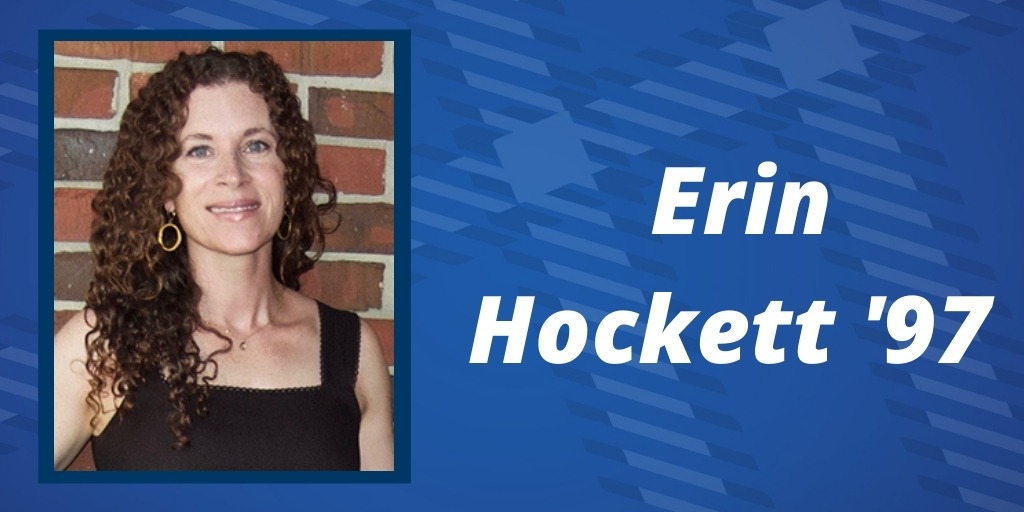Special education major “pays it forward” as an occupational therapist
 When she was a PC student, Erin Hockett ’97 spent one summer working as a counselor at an Easter Seals camp for people with disabilities. What Hockett remembers most about the camp are the stories the campers would tell.
When she was a PC student, Erin Hockett ’97 spent one summer working as a counselor at an Easter Seals camp for people with disabilities. What Hockett remembers most about the camp are the stories the campers would tell.
“I heard inspirational stories from campers about how much their occupational therapists meant to them and how they helped them live their lives as independently as possible,” she said.
One camper, who endured traumatic brain injury after a motorcycle accident, talked about how an OT helped him relearn how to perform activities of daily living such as feeding himself with utensils, getting dressed, grooming and doing simple tasks that were required to live independently. Another camper with moderate cerebral palsy told stories about how an OT helped her get herself ready independently using adaptive equipment.
“My experience at this camp sealed my decision to be an OT,” Hockett said. “I chose special education as my major at PC with the plan to attend a graduate school with an OT program.”
Becoming an OT
Hockett did earn a graduate degree in occupational therapy after graduating from PC and found her calling as a pediatric occupational therapist shortly after. She worked as an OT for Easter Seals for nearly two years before serving as a pediatric OT in home and community settings in Charlotte.
In 2005, Hockett opened her own private practice, Sprout Developmental Services, in Charlotte. Her practice provides occupational and physical therapy services to children from birth to age 3 who have developmental delays.
“My goal is to decrease the potential for developmental delay and enhance their development as I help families meet the special needs of their infants and toddlers,” Hockett said.
“For example, in my work in early intervention, occupational therapy can help children with developmental delays or who are at risk for delays by improving their motor, sensory processing, cognitive, communication and play skills.”
One Special Moment
Hockett’s journey in wanting to become an OT began when she was diagnosed with a profound hearing loss when she was an infant. Her experience with speech therapists from early on and throughout high school inspired her to help those in need ever since.
“I wanted to give back by serving in a helping profession like speech therapy, physical therapy, and occupational therapy,” Hockett said, “and OT is what I chose.”
One patient Hockett remembers most is deaf, blind, and suffers from severe cerebral palsy.
“Her movements were spastic and limited,” Hockett said. “Her play opportunities were entirely dependent on someone providing the support for her. She could see vaguely certain colors such as red, yellow, white and black and she could hear with her hearing aids.”
Hockett and the patient’s family worked together to find toys and switches with large buttons and lights that had the colors the patient could recognize: red, yellow, white and black.
Hockett came up with exercises and activities that would strengthen the patient’s neck and arm muscles and increase the range of movement in her arms. Hockett coached her family in carrying out these exercises on a daily basis.
“All the work we did came together beautifully during one therapy visit,” Hockett said.
“The girl turned her head to find the white toy against a black surface and moved her hand to hit the buttons to activate music and lights. The best thing about this special moment was seeing her face break out in a huge, radiant smile. She now could play with a toy independently.
“Later, she moved on to adaptive technology where she could request what she wanted, increasing her independence.”
PC a “Perfect Fit” for OT
Hockett says that OT is a “very rewarding and fulfilling profession.”
“Over the years, I’ve learned many important lessons from my patients and their families,” she said. “It has been a privilege for me to work with them and they’ve brought me joy, watching them reach their full potential.”
Hockett says PC’s motto, “While We Live, We Serve,” “perfectly fits the description” of the role an occupational therapist has for people with special needs.
“With PC’s close-knit community of professors and students, the exceptional teaching of their professors, the wealth of their resources and valuable connections, I can envision how successful and meaningful this OT program can be for their future students,” Hockett said.
“PC prepared me well for my life as a person, giving me a well-rounded education that is applicable in all areas of my life, and an OT who wants to pay it forward.”
Become an Occupational Therapist
Are you interested in making a difference as an occupational therapist? Applications are still being accepted to begin the program in January. Apply using the Occupational Therapist Centralized Application Service. For more information about the program please call 864-938-3710 or complete this form.
